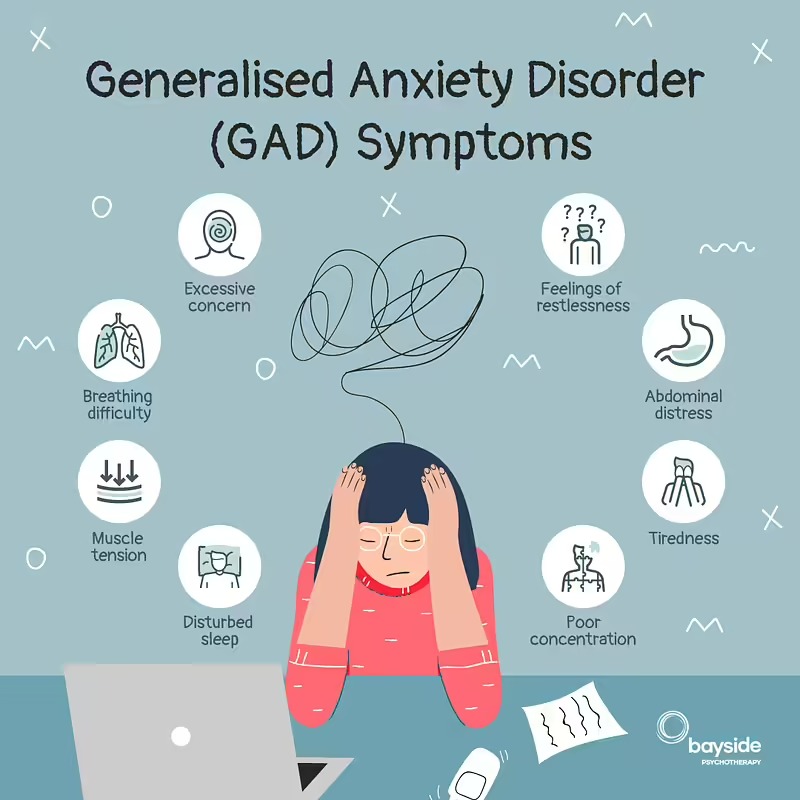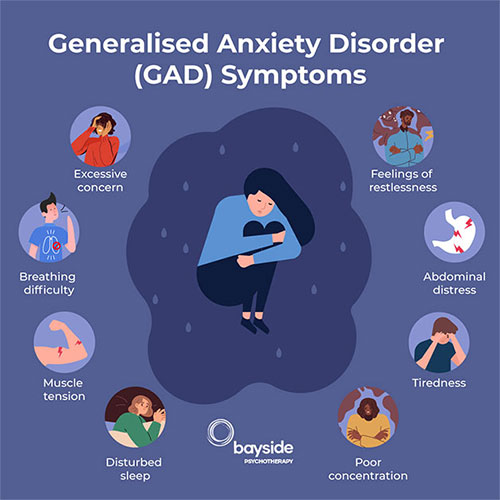Discovering Various Approaches in Therapy for Anxiousness Problem for Long-term Adjustment
When tackling anxiety disorders, it's vital to check out a variety of counseling techniques. Each approach uses unique insights and tools to help you manage your signs and symptoms efficiently. You might find that combining strategies can produce the best outcomes. Comprehending the subtleties of these strategies is key to promoting long lasting modification. What if the best combination could release a brand-new degree of emotional wellness for you?
Understanding Anxiousness Problems: A Brief Introduction
Stress and anxiety disorders, which influence countless people worldwide, can greatly influence everyday life. You might experience overwhelming feelings of fear or stress that seem unmanageable. These feelings can lead to physical signs and symptoms like a racing heart, sweating, or also lightheadedness. Typical types of anxiousness conditions consist of generalised anxiety problem, panic condition, and social anxiousness problem. Each has distinct indications, however they all share a tendency to interrupt your routine and relationships.Understanding the origin creates of your anxiety is important. It may come from genetics, mind chemistry, or life experiences. Recognizing your triggers can aid you manage your reactions much better. It is essential to remember that you're not alone in this struggle. Several people deal with comparable difficulties, and seeking assistance is a solid step toward sensation better. By finding out about anxiety problems, you're already on the course to understanding and handling your problem a lot more efficiently.
Cognitive-Behavioral Treatment: Testing Unfavorable Idea Patterns
In Cognitive-Behavioral Therapy, you'll begin by recognizing the negative thought activates that contribute to your stress and anxiety. As soon as you recognize these thoughts, you'll deal with replacing them with more positive options. Together, you'll develop efficient coping strategies to aid handle your anxiousness in day-to-day situations.
Determining Adverse Thought Triggers

Identifying the certain triggers behind your unfavorable ideas can be essential in managing anxiety when you run into moments of distress. Start by taking notice of situations that prompt sensations of worry or worry. Is it a crowded room, a forthcoming deadline, or a discussion with particular people? Take down these instances in a journal. This will help you determine patterns in your reasoning. Additionally, notice physical experiences that accompany your adverse ideas, like a racing heart or rigidity in your upper body. By determining these triggers, you gain understanding into what's fueling your anxiousness. Comprehending these links is the initial step in challenging those thoughts and eventually restoring control over your emotional feedbacks.
Replacing Ideas With Positives
Testing negative idea patterns is a vital step in transforming your frame of mind and minimizing anxiousness. You may usually find yourself caught in cycles of self-doubt or catastrophic thinking. As opposed to allowing these thoughts determine your sensations, practice replacing them with reasonable options or favorable affirmations. For example, when you believe, "I can not manage this," change it to, "I can handle challenges one action at once." This straightforward adjustment can considerably influence your psychological state. Frequently determining and responding to these adverse ideas aids produce a much healthier interior discussion. Keep in mind, it requires time and initiative, yet consistently practicing this technique can cause enduring change, encouraging you to encounter anxiousness with renewed self-confidence and durability.
Building Coping Techniques Together
Replacing negative ideas is just the beginning of managing stress and anxiety successfully. To develop enduring change, you need to construct coping approaches that encourage you. Cognitive-Behavioral Treatment (CBT) aids you determine and test those purposeless idea patterns. With each other, you and your therapist can check out how these thoughts effect your feelings and behaviors.Start by developing useful methods, like journaling or mindfulness workouts, that enable you to confront anxiety head-on. When you encounter your concerns slowly, you'll learn to react in a different way.

Mindfulness and Acceptance-Based Approaches: Growing Present-Moment Awareness
As you navigate the intricacies of anxiety, including mindfulness and acceptance-based methods can significantly enhance your capability to cultivate present-moment understanding. By concentrating on the right here and now, you'll locate that you can observe your thoughts and sensations without judgment (Counseling services for anxiety). This method helps you recognize your anxiousness without feeling overwhelmed by it.Engaging in mindfulness exercises, such as deep breathing, body scans, or led meditations, enables you to ground on your own in your existing experience. Acceptance-based approaches encourage you to accept your feelings instead than fight against them. When you accept your feelings, they lose their power over you.Incorporating these methods right into your daily routine can change just how you react to anxiety. You'll create durability and discover to navigate difficult scenarios with higher convenience. Inevitably, growing present-moment recognition lays the foundation for long-term change, empowering you to lead a more fulfilling life
Exposure Therapy: Challenging Fears Progressively
Direct exposure treatment helps you face your concerns in a progressive method, making it less frustrating. You'll learn techniques to encounter anxiety-provoking scenarios detailed, while likewise developing coping techniques to manage your reactions. This strategy equips you to take control and minimize stress and anxiety in time.
Steady Direct Exposure Strategies

When encountering anxiety, progressively facing your fears can be an effective method to regain control. This method, referred to as steady exposure, includes gradually subjecting on your own to the circumstances or objects that activate your anxiety. Begin with much less intimidating circumstances and gradually function your means up to more tough ones. If you're worried of public talking, you might start by talking in front of a mirror, then advance to sharing ideas with a buddy, and at some point address a small team. Each step assists desensitize you to the anxiety, building your confidence gradually. Remember, it's important to rate yourself and celebrate tiny victories as you move with this procedure, enhancing your capacity to handle stress and anxiety properly.
Structure Coping Strategies
Structure effective coping techniques is necessary for taking care of anxiousness, specifically as you face your anxieties slowly - Counseling services for anxiety. One powerful technique is exposure therapy, where you begin by go now facing your fears in a controlled manner. Start with less intimidating scenarios and gradually function your method as much as even more tough circumstances. This progressive exposure aids desensitize you to anxiety causes, making them much less overwhelming.Incorporate relaxation methods, such as deep breathing or mindfulness, to calm your mind during exposure. Track your development, celebrating small success along the means to enhance your self-confidence. Keep in mind, it's alright to take your time; the goal isn't perfection but constant renovation. By developing these techniques, you'll equip on your own to navigate stress and anxiety and Extra resources welcome life extra fully
Psychodynamic Treatment: Discovering Source of Stress And Anxiety
Psychodynamic therapy explores the subconscious mind, revealing the source of your anxiety. By analyzing your ideas, feelings, and previous experiences, this strategy assists you uncover underlying problems and unsettled issues that might add to your current anxiousness. You'll work with a specialist to examine youth experiences, connections, and emotional patterns that form your responses today.As you get insight right into these deeper layers of your subconscious, you'll start to identify exactly how previous events affect your present habits. This understanding can result in catharsis, allowing you to process feelings you might have suppressed.Through the restorative relationship, you can additionally identify protection devices that may have created gradually, offering a clearer course to change. Eventually, psychodynamic therapy furnishes you with the tools to resolve your anxiety at its core, advertising enduring improvement in your emotional well-being.
Alternative and integrative Approaches: Incorporating Strategies for Greater Efficacy
Integrating numerous therapeutic methods can boost your journey toward handling stress and anxiety better. By integrating aspects from cognitive-behavioral treatment, mindfulness techniques, and all natural approaches, you can produce a tailored strategy that addresses your unique needs. For circumstances, you could use cognitive-behavioral techniques to test unfavorable thought patterns while integrating mindfulness workouts to ground yourself in the existing moment.Additionally, discovering holistic practices such as yoga or reflection can advertise relaxation and decrease anxiety symptoms. This blend enables you to develop higher self-awareness and resilience.Experimenting with these varied techniques can assist you find what reverberates most with you. Bear in mind, it's concerning discovering a synergy that functions, instead of adhering to a solitary technique. This integrative technique not only offers immediate alleviation however also cultivates long-lasting abilities for taking care of stress and additional reading anxiety, equipping you to recover control over your life.
The Role of Assistance Systems: Structure Strength Through Link
While it may seem that handling stress and anxiety is a solitary trip, having a strong support group can play a vital function in your resilience. Bordering yourself with compassionate pals, household, or support system produces a secure area where you can freely share your experiences and sensations. When you get in touch with others, you advise yourself that you're not the only one in this struggle.These partnerships supply inspiration and can offer practical coping approaches that have helped others. It's likewise an opportunity to gain point of view; buddies can help you see scenarios differently, minimizing sensations of isolation.Moreover, emotional support cultivates a sense of belonging, which can significantly relieve anxiety signs. By leaning on your support group, you can develop resilience and deal with difficulties better. Bear in mind, getting to out for help is a sign of stamina, and it can make all the distinction in your journey toward handling stress and anxiety.
Often Asked Inquiries
What Are the Usual Symptoms of Stress And Anxiety Conditions?
You may experience uneasyness, tiredness, trouble focusing, irritation, muscular tissue stress, and rest disruptions. Physical signs and symptoms can consist of quick heart beat, sweating, and shivering. Recognizing these signs early can aid you look for ideal assistance and therapy.
For How Long Does Treatment Normally Last for Anxiety Conditions?
Therapy for anxiousness disorders generally lasts anywhere from a few weeks to numerous months. It actually depends upon your individual needs, progress, and the methods your specialist utilizes to assist you manage your anxiety properly.
Can Medication Be Used Alongside Treatment for Stress and anxiety?
Yes, medicine can absolutely be made use of together with therapy for anxiety. Incorporating both techniques often enhances therapy efficiency, helping you take care of signs and symptoms while discovering underlying problems through therapy (Counseling services for anxiety). Always consult your healthcare service provider for personalized suggestions
Are There Self-Help Methods for Managing Anxiety?
Yes, there are numerous self-help strategies for taking care of stress and anxiety. You can exercise mindfulness, participate in routine workout, maintain a well balanced diet regimen, establish a regular, and use deep breathing techniques to assist minimize anxiety signs and symptoms efficiently.
Just how Do I Know if I Need Specialist Help for Stress And Anxiety?
